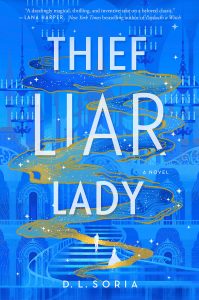Archita Mittra Reviews Thief Liar Lady by D.L. Soria
 Thief Liar Lady, D.L. Soria (Del Rey 978-0-59335-805-4, $28.00, 416pp, hc) June 2023.
Thief Liar Lady, D.L. Soria (Del Rey 978-0-59335-805-4, $28.00, 416pp, hc) June 2023.
Fairytale retellings have been perennially popular, offering readers the chance to relive the magic and mayhem of a familiar world while also discovering something new about it. Take for instance the tale of Cinderella, where the main character’s escape from a dreary and deeply unjust reality isn’t just temporary (as secretly attending a royal ball might initially suggest), but a permanent happily-ever-after with Prince Charming. The escapist and utterly miraculous elements of the original story (especially the glass slipper designed only to fit one special person) definitely evoke some primal longings in those who perhaps are not as lucky as Cinderella. But such readers can definitely take a break from mundanity in the pages of fantasy fiction, such as Marissa Meyer’s futuristic Cinder, where the protagonist is a cyborg, or Ashley Poston’s Geekerella, which is a loving homage to fandom communities and cons, or Gail Carson Levine’s delightful Ella Enchanted, or even the recent S. Jae-Jones title, the wondrous Guardians of Dawn: Zhara, where the magic has shifted to an East-Asian-inspired fantastical setting. But D.L. Soria, in her adult fantasy debut, Thief Liar Lady pushes the boundaries of retellings even further by asking the question: What if the much-beloved fairytale was actually built upon a lie?
This refreshingly unique story begins with Ash, having tricked her way to royalty and secured the affections of Prince Everett – all of which is part of a long game engineered by her ruthless stepmother Seraphina to get power and financial security for herself. But the fake identity of Lady Aislinn isn’t Ash’s only secret – she’s also in league with her grandmother with ties to the rebels, to renegotiate a treaty between Solis and the neighbouring country of Eloria that it conquered some 20 years ago, and set free war prisoners from the palace dungeons. To accomplish all this, Ash is reliant on ‘‘lustre’’ (an extremely expensive magical powder that allows the user to weave spells and manipulate people’s emotions), even as she dreads her upcoming marriage to the bland and besotted Everett while stifling her slow-blooming feelings for Rance, the rascally handsome ‘‘hostage prince’’ from Eloria.
Thief Liar Lady is very neatly plotted, and the first-person narration (tempered with occasionally snarky observations) grows on the reader as we see Lady Aislinn struggle to maintain her mask of naïveté and innocence at court and grapple with her insidiously shifting loyalties. While her abusive stepmother has taught her how to survive with lies and trickery, Ash also has sympathies for the rebels and refugees since her biological mother was from Eloria. So, on one hand, she’s riddled with guilt for casting love spells on Everett, but on the other, she is convinced that her royal positioning (no matter how dubious) is crucial to eventually freeing her people. Thus, soon enough, she fumbles in her con-woman veneer and is caught in a dangerous game between selfishly following her heart and doing what is expected of her.
The author doesn’t shy away from depicting the dark consequences of Ash’s decisions – she’s forced to consummate her marriage with Everett to win his trust, complicating the question of consent since Ash has clearly no interest in having sex with the prince whose lustful feelings are the product of her own powerful spell, placed at her step-mother’s behest. But then in a surprising twist à la The Cruel Prince, much of the royal family is mysteriously assassinated and all suspicion falls on Rance. He’s made a scapegoat and thrown into prison, further jeopardising the strained relations between the two countries, prompting Ash to finally follow her heart.
Ash comes off as a very real and endearing character, cornered into moral conundrums and forced to make difficult decisions, although her conning skills are somewhat lacking – she makes certain mistakes and lets her mask slip, but is saved by several strokes of good luck. The resource of lustre – incidentally the only ‘‘magic’’ in the book – is also conveniently deployed. Despite being a prized resource with a potency to manipulate people, it is rarely used by other characters who, unlike Seraphina and her special dealer, are seemingly unaware of its full powers. As such most members of the royal family are unprotected and oblivious of its influence, which makes it somewhat easy for Ash to ensnare the royal prince at a masquerade ball and later, for the assassinations to take place.
Since the narrative unfolds from Ash’s limited perspective, Soria veers away from much of the political machinations, the economic devastation of Eloria (after the war with Solis) and the rebellions taking place off-screen (although they are referenced), and instead focuses on her struggles to find a compromise between aiding her community and securing her personal happiness, sprinkled with some romantic intrigue. While Seraphina remains irredeemable, Ash’s complicated relationship with her two stepsisters gradually evolve for the better – a small step in healing the cycle of manipulation, abuse, and gaslighting begun by the stepmother and inadvertently continued by Ash in her repeated casting of spells to manipulate the prince. Perhaps this is also why ‘‘confessions’’ of one’s crimes becomes a prominent theme and pivotal plot point in the latter half of the novel. But the best bit in Thief Liar Lady is Ash’s illicit romance with Rance (whose initial rapscallion behaviour reminded me somewhat of Daemon Targaryen from House of the Dragon), which gets deliciously steamy and resolves in a thoroughly satisfying manner.
Overall, Soria’s latest novel is hugely fun, sexy, and enjoyable. It begins by questioning some of the conceits of the original fairy tale that readers tend to take for granted, while ingeniously finding its own way to a familiar happily-ever-after. Thief Liar Lady is sure to appeal to lovers of romantasy novels and fairy tales retold with a grittier undertone.
Archita Mittra is a writer and artist, with a fondness for dark and fantastical things She completed her B.A (2018) and M.A (2020) in English Literature from Jadavpur University and a Diploma in Multimedia and Animation from St. Xavier’s College.
When she isn’t writing speculative fiction or drawing fanart, she can be found playing indie games, making jewelry out of recycled material, reading a dark fantasy novel, baking cakes, or deciding which new Tarot deck to buy.
She lives in Kolkata, India, with her family and rabbits.
This review and more like it in the November 2023 issue of Locus.
 While you are here, please take a moment to support Locus with a one-time or recurring donation. We rely on reader donations to keep the magazine and site going, and would like to keep the site paywall free, but WE NEED YOUR FINANCIAL SUPPORT to continue quality coverage of the science fiction and fantasy field.
While you are here, please take a moment to support Locus with a one-time or recurring donation. We rely on reader donations to keep the magazine and site going, and would like to keep the site paywall free, but WE NEED YOUR FINANCIAL SUPPORT to continue quality coverage of the science fiction and fantasy field.
©Locus Magazine. Copyrighted material may not be republished without permission of LSFF.







